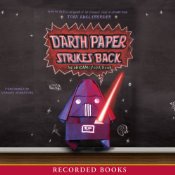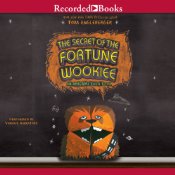Teresa is once again hosting the Original Audio Book Challenge (click on the image above to head over to the site.) There are five levels to the challenge, the first being "Flirting" wherein a participant listens to six audiobooks. I've completed this level and am now committing to the next level, "Going Steady" which is twelve titles! Without further todo, here are the titles and commentary for the six audiobooks I have listened to so far this year:
The Bad Beginning
(by Lemony Snicket; multi-voiced production starring Tim
Curry)
Ⓟ October 24, 2004, Harper Audio
2 hours, 29 minutes
Children, Ages 8-12
This was an impulse purchase that somewhat defies my usual
listening/audiobook practices in that I have already read and enjoyed the first
three Series of Unfortunate Event books and, grittier noir fare is more to my
liking. But there it was, in the $5.95 "bin" at iTunes and I thought,
"What the heck. I haven't heard the multi-voiced version..." For the
uninitiated, the Series of Unfortunate Events is about three children who are
orphaned and subsequently remanded into the care of legal guardians. In The Bad
Beginning, the children encounter their first and greatest nemesis, Count Olaf,
who hopes to gain control of the Beaudelaire fortune. At the beginning of the
book and audio, the narrator warns you repeatedly that this is not a HEA tale,
and yet I must admit to being somewhat chagrined to realize that the book does
not indeed end happily ever after! But hope must spring eternal, as after all,
I continue to read more in the series! In the books, the illustrations of Brett
Helquist grace the covers and chapter headings. I don't know what the original
medium was, but they give a feel of having been rendered in pen-and-ink and are
somewhat reminiscent of Edward Gorey's Victorian-like artwork. You don't get
the artwork with the audio of course, but the trade off is that you get Tim
Curry as the narrator! He has a lovely, smooth, slightly aged British voice
that knows how to render the angst and pathos of the story without totally creeping
you out. You sense that he is in control of the story and your attention.
Harper Audio has cut his narration with some other (uncredited) voices for the
multi-voice edition and for the most part everything works. The talent voicing
Mr. Poe is wonderfully snuffly and priggish and, with the exception of Mr.
Poe's children, the children actually sound like children (as opposed to adults
pretending to be children.) Count Olaf is nasty and oily and the children are
precocious without being annoying. The only quibble I had was at the beginning
of the production when the sound effects were applied a bit heavily and, there
was an odd three-stroke monotone key that was applied at least twice during the
story. I have no idea what this sound effect was supposed to be or signify so
it was a little bit distracting. Still, all in all, well worth the money.
The Reptile Room
(by Lemony Snicket; narrated by Tim Curry)
Ⓟ September 9, 2003, Listening Library
3 hours, 11 minutes
Children, Ages 8-12
The Beaudelaire orphans have now been remanded into the
custody of their distant uncle-by-marriage, Uncle Monty who is a herpetologist.
Count Olaf returns to threaten their very lives in a scheme of boldly conceived
subterfuge. Lemony Snicket's brilliance lies within making absurd situations
feel real with the tension; his humor; and not only explaining vocabulary words
but in applying those words analogously to provide greater comprehension. Tim
Curry's voicing of Lemony Snicket/the narrator, Count Olaf and Mr. Poe was
fabulous; the kids? Not so much; but overall it was very entertaining. If I did
find my attention wandering a little bit, I think it's only because I did just
recently read the book in print and I gave myself permission to think about
something else at the less engaging parts. I bought the 3-CD set in 2011 and
while it doesn't include all of Helquist's artwork from the book, the packaging
is pretty nice: The cover matches the book cover, the interior contains a clip
of Helquist's work in the CD beds and there is another graphic printed
edge-to-edge on the CDs themselves. If you are wondering why I'm mentioning the
artwork, it's because the quasi-Victorian feel of the illustrations adds to the
overall feel of the work.
I purchased a retail copy of this audiobook from an online vendor (barnesandnoble.com ?)
The Strange Case of Origami Yoda
(by Tom Angleberger; narrated by Charlotte Perry, Mark
Turetsky, Greg Steinbruner, Jonathan Todd Ross and, Julia Gibson)
Ⓟ October 2010, Recorded Books
2 hours, 14 minutes
Children, Ages 8-12
The book is a "case file" compiled by 6th grader
Tommy as a way to figure out whether the advice-dispensing finger puppet worn
by the class loser is genuine in its mysticism or an elaborate hoax perpetuated
by the wearer. The collection of anecdotes which serve as testimony to the
validity of Origami Yoda is humorous and the overall story arc is very clever. Mark Turetsky was very good as the story's narrator Tommy, but the rest of
the cast sounded too old to be believable as a bunch of eleven- or twelve-year
olds. The book did not contain the marginalia and supplemental material that
was included in the book and; my daughter thought it would have been great had
the publishers included a copy of "The Twist" (by Chuck Berry) at the end as
bonus material; but nonetheless, my daughter enjoyed it so much that she asked
if we could listen to the other books in the series :-)
I dnloaded a digital copy of this audiobook from iTunes.
**********
Darth Paper Strikes Back
(by Tom Angleberger; narrated by Mark Turetsky, Julia Gibson,
Jennifer Ikeda and Ali Ahn)
Ⓟ October 2011, Recorded Books
3 hours, 45 minutes
Children, Ages 8-12
Dwight/Origami Yoda are threatened with expulsion from
school after Dwight appears to have threatened another student.
Tommy, who created a case file to prove the credibility of Origami Yoda in the first book in the series, The
Strange Case of Origami Yoda, puts together another set of testimonials to show
how Dwight/Origami Yoda are actually with the Force. Harvey/Darth Paper serve
as the story's antagonist/s; but not all is at appears, even Harvey! The surprise ending, as well as the story throughout, is fun, funny and
clever, though the whole falls just a little bit shy of the brilliance of the
first-in-series. Mark Turetsky remains the star of the cast, and my daughter
doesn't care that the rest don't sound like her classmates! I've skimmed through the print copies of the Origami Yoda books and mentioned to my daughter that if she wanted to get the books to check out "Kellon's"
drawings (the illustrations in the book) or the activity pages in the back of
the book, I would have no qualms about doing so. I feel like she's missing out a little bit by not seeing the illustrations, but so she has definitely been entertained by the audio!
I dnloaded a digital copy of this audiobook from iTunes.
**********
The Secret of the Fortune Wookiee
(by Tom Angleberger; narrated by Julia Gibson, Jennifer
Ikeda, Ali Ahn, Jonathan Todd Ross, Mark Turetsky and, Greg Steinbruner)
Ⓟ August 2012, Recorded Books
3 hours
Children, Ages 8-12
This is another "case file" that the main
character, Tommy delivers in his investigation into an origami figure, this
time a fortune teller folded in the likeness of Chewbacca! The third in the
Origami Yoda series, it was as equally fun as its predecessors and Mark
Turetsky, the narrator who voices Tommy is excellent as always. This time he
outdid himself with truly the best Chewie impersonation ever! And I do mean
ever! The rest of the cast however sounds too old to be playing their roles;
but the target audience of children, ages 8-12 are unlikely to care. My
daughter, however did complain about one narrator (Julia Gibson who plays the character, Sarah) whose "esses"
"hurt her ears." It's a case of sibilance striking the eardrums
sometimes painfully. This could be an instance of the narrator having a lisp,
poor mic placement and/or, poor post processing. There were also some unusually
long pauses in the middle of the story which were a bit distracting. Here I
suspect poor editing. Check this one out from the library, listen for Mark
Turetsky's Chewie, then switch to print which has the added bonus of
"Kellon's" drawings :-)
I dnloaded a digital copy of this audiobook from iTunes.
**********
The Eleventh Plague
(by Jeff Hirsch; narrated by Dan Bittner)
Ⓟ September 01, 2011, Scholastic Audio
7 hours, 3 minutes
Young Adult
A fifteen-year old boy and his father are salvagers in an
American landscape ruined in a biological war with China. They end up in a
suburban settlement which offers them help and safety and, its own risks and
dangers as well. The story starts out dark and interesting; but fails to
maintain the mood or create an alternate tenor effectively. There are some
better-than-average descriptive phrases and the story is not without meaning;
it just fails to deliver on the promise of the opening passages. Nonetheless,
the narrator was excellent, voicing the young teens, older adults and females
without fault.
I borrowed a CD copy of this audiobook from the Jackson County Libray System (Southern Oregon.)
I receive no monies, goods or services in exchange for reviewing the product and/or mentioning any of the persons or companies that are or may be implied in this post.










